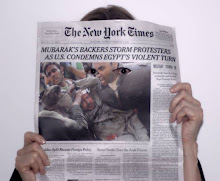There's a good thing going on at the paper. It looks like a campaign alerting people to the fallibility of Google. This is new to layman, who has been taught that Google is so powerful that it has become a verb indicating a superintelligence.
I applaud the effort. Google search is cruel. Billions of pages are indexed. Not-so-common words appear millions of times in those pages. There's no point in seeing all of the page when you search. Google limits you to a few hundred. In practice, you'll rarely glance at the links to even 10. In other words, the odds of your searching for and finding my effort here are infinitesimal. In very general terms, its approach is well known. Google counts the links that point to a web page, adjusting for the reputation of the linking page, and ranks the most frequently, most authoritatively linked page on top. The Times article tells us that it can be broken.
Google religiously protects its secret ranking procedure, but there is a big trade in people claiming that they can fool this system -- under the rubric of search engine optimization. Many of them create dummy pages of links that you, some obscure web site owner, can buy into. Google also strenuously affects that it cannot be easily gamed.
But someone noticed the unseemly position of J.C. Penney rankings on Google, and the Times called Mountain View, Calif. It took only hours until Penney was blacklisted from the top results on the Times's search terms, and they remain off.
Penney still ranks high on Bing and Yahoo in one of the Times's test searches -- for dresses. Ask, the forgotten search engine, puts Penney down on page 4 of the listing, and Google has them on page 6.
There are two things I want to know: How did the Times realize this? It's probably as much a secret as Google's page-rank, but I think it would be neat if the paper explained it. We all know that serendipity has a place in the sun.
More important, how many others are up there illegitimately in the search results? Penney, the tottering, declassé department store, would look like an anomaly to a staffer on the Times or his spouse. So tell me now, what about Amazon? And how well do Google advertisers do?
NYT article: The Dirty Little Secrets of Search
I did a doubletake when I came across a short item in the Times Magazine about electronics in coffee shops -- in particular the fancy, un-Starbucks cafes, which the writer calls indie cafes. (I would ban the use of the word indie to connote cool or hip.)
The piece was chatty, but also confusing and annoying. The writer, Virginia Heffernan, laments that many of these shops have banned Kindles and iPads, and layers on some historical trivia about coffeehouses, which describes cafes as raucous places, but she seems to savor the solitude of cafes -- "it's the job of anyone in a public space to learn the fine art of ignoring people." She makes the necessity of being cautious about responding to strangers in a crowded place like the city sound even snottier than it looks.
The prohibition she talks of just doesn't ring true. There are several little coffee places in my neighborhood that have survived the Starbucks onslaught, and all of them are always filled with people staring into little screens. I can think only that she was told to turn off her own device and she turned the minor indignity into a column. That's what newspapers do, but they never admit it.
It's been years since I looked at the magazine so I had to do a bit of research here. I see this is supposed to be a cool, hip column. The question addressed by the column as described in a blurb about the blog about the web, is "Who's going to watch all this here-goes-nothing online video?" She promised that she will "find, review and make sense of all those senseless new images."
So I get it, the rationale is snobbery to begin with. The execution is nothing like the promise. It's an absurd claim. There are billions of web pages. It would take a lifetime for a live human being to count that high, much less watch, or read. (Very few of her columns actually mention video.) She seems to avoid web pages as such in favor of personal experiences. I looked at two recent columns, one touting Tor, the anonymous browsing tool, and the other a review of the movie The Social Network. I understand why she's been called the Sarah Palin of journalism.
NYT article: The Medium: Table Disservice
One last note. I objected yesterday that the Times's news analysis on Egypt by Anthony Shadid failed to mention Iran, despite the obvious parallel. Another news analysis by him appeared today addressing this. (I wish I could claim credit, but in good conscience, I can't.)
I don't think anyone can predict the future, but Shadid points out that these are two different countries. Yes, but I hope that someone addresses what happened in Iran 30 years ago in detail. I think that Iran was neither parochial nor depressed nor backward. In fact, Egypt seems to be in worse shape. I'm still waiting to see this discussion in the Times.
But for the record, since I've been reading what I can find about Egypt in the past two weeks, I guess that it's a good bet that Egypt will not become a theocracy. I think the danger to the well-being of the Egyptians will be the army and the culture that has known only authoritarian rule. I warn you, this is a hunch from someone who's not Egyptian, and not an expert.
NYT article: Egypt’s Path After Uprising Does Not Have to Follow Iran’s
Sunday, February 13, 2011
Subscribe to:
Post Comments (Atom)

No comments:
Post a Comment